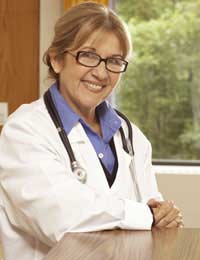Information and Advice about Breast Cysts

Most breast cysts are discovered either during breast self exams or clinical breast exams when they are felt beneath the skin or observed externally as a protuberance in the breast. Though cysts may be painful, they are usually benign and in no way indicative of breast cancer or any other serious condition. However, if a cyst is felt or observed, it should be reported to a doctor immediately for further investigation and treatment.
Anatomy of the Breast
Breasts are made up of mammary glands, connective tissue, fat and ligaments, though primarily of fat. This means that breasts often change size depending upon recent weight gains or losses. Breasts sit over the pectoral muscles of the chest, and each breast has a nipple with a surrounding areola. Cysts are normally felt in the more fatty areas of the breast, and indeed some cysts are moveable throughout the breast.Composition of a Cyst
Cysts are fluid-filled sacs. Usually cysts are small and feel smooth, but sometimes they may grow large enough to be seen within the breast. Cysts that are this large may be painful. Cysts are most often seen in women between the age of 30 and 60 and are particularly common in women who are just a few years away from menopause. However, cysts may be found in women of all ages and it should be remembered that the presence of cysts in the breast does not increase the chances of developing breast cancer.Discovering Cysts in the Breast
Women’s breasts are all different, so it is important for each woman to understand what her own breasts normally feel like so that she will be able to easily recognise any changes should they occur. The best way for a woman to become familiar with her breasts is to carry out monthly breast self exams. By consistently observing and feeling her own breasts, a woman will be able to keep track of any patterns of changes (such as those related to the menstrual cycle) and any changes that are not related to a consistent pattern. Usually cysts are discovered by a woman while she is either looking at or feeling her breasts and notices a lump. Cysts may also be discovered during a clinical breast exam in which a trained professional observes and/or touches the breast and finds the lump.Reporting Lumps in the Breast
Women who discover a lump in their breast should report it to their doctor immediately. It would be hard to know what the lump is simply from a breast self exam, so most GPs will also conduct a clinical breast exam. If a lump is found at this time, the GP may ask the woman to return in a week for another exam. This would be simply so that the GP can determine if the lump is cyclical in nature. If the lump is still there upon re-examination then further testing may be recommended. Mammograms, ultrasounds, aspirations and biopsies are just a few of the methods by which a doctor may investigate a breast lump. Cysts are often treated by aspirations, or the insertion of a needle into the lump to withdraw fluid. Usually once the fluid is withdrawn the cyst disappears, but if the fluid includes blood then further investigation will likely be required.Cysts in the breast are usually benign, but it can be frightening for women to find a lump in their breasts and not know the cause. Reporting the lump to a doctor immediately is the best course of action to take so that it can be diagnosed and treated appropriately.
Related Articles in the 'Breast Health' Category...
- Benign Breast Conditions Explained
- Men and Breast Health
- Breasts and PMT
- Information about Breast Calcifications
- Breast Discharge: Possible Causes and Action to Take
- Lumps in the Breast: Possible Causes and Action to Take
- Breast Pain: What is it and What Could be the Cause?
- How and When to do Self Examination on Your Breasts
- Breast Screening in the UK
- Common Questions About Breasts and Health
- What Is Breast Health?
- Common Questions about Mammograms


Re: Breasts and Sun Protection
I laid out topless for the first time in my life, and will never do it again! I stayed out rotating and basting for a hour before I…
Re: Breasts and Wrinkles
Hi, i stopped breastfeeding last year and i have been using over counter pills for quick drying up. now my breast are flat and wrinkled.…
Re: Breasts and Wrinkles
One of my breast grew a lot during pregnancy. The same got engorged post delivery. One i got relieved from engorgement, this brest has sagged…
Re: Breasts and Sun Protection
@Bec - it will go - just be careful in the future. This is such a sensitive area of the body you have to be careful.
Re: Breasts and Wrinkles
My breasts are starting to gather wrinkles on the top and I would appreciate some advice on creams or something I can do to prevent this from…
Re: Breast Tattoos
Am getting my first tattoo, and I'm getting it on my left Breast. The tattoo will be a Rose, as it's my favourite flower. Anyone got any advice for…
Re: Skin Creams for Breasts
I have a proble my breast makes me uncomfortable when it comes to undress myself ever since i breastfeed.so i don't know what to do…
Re: Breasts and Wrinkles
Hi there, i've just started breatfeeding 18 days ago. Ive noticed a dry, scaly, wrinkly patch of skin on my boob. It's not itchy or painful.…
Re: Treating Breast Acne
My wife has got a big and hard pimple on her breast.The pimple doesn't get the mouth so pus will come out. To which doctor I'll go and how…
Re: Benefits of Breast Reduction
@rashmi - I'm afraid we can't recommend specific specialists, so you would have to do an online search for breast reduction…